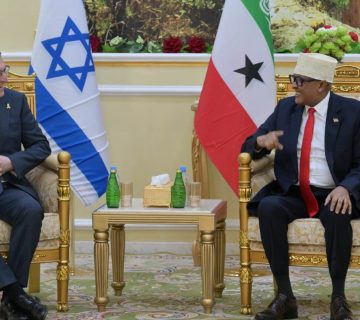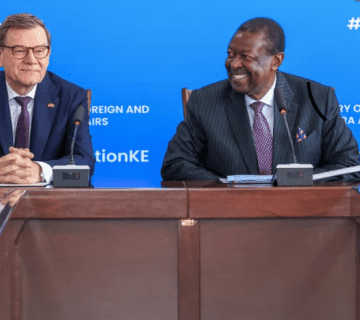While the outcome of November 3, 2020, US presidential elections remains challenged at the federal courts by the incumbent, President Donald Trump, there is an overwhelming projection for former Vice-President Joe Biden’s victory. As such, the world has begun preparing for a Biden presidency, with congratulatory messages and well wishes pouring in from across the world’s major capitals and organizations such as the United Nations and the African Union. The Western world is particularly excited by the prospect of a Democratic presidency and is already warming up to Washington D.C. with a wish list of demands, conceivably including strong US participation and leadership in climate change, international trade, security partnership, the NATO alliance, and shared values and norms.
However, the next US administration will face the greatest challenge of image and character after four years of Trump’s uncanny presidency and global conduct, which undermined US moral leadership and normative position on climate change, international trade, conflict, and human rights, democratic governance, and international aid. The other challenge to face a Biden presidency is the resultant decline in US global role and standing, in the face of rising multipolarity and emergence of China and the Russian Federation as contending world powers, already shoring up their influence in various parts of the world including Africa, Asia, the Middle East, and Latin America.
The Status of US-Africa Relations
While Africa proved strategically important to US foreign policy during the Cold War, this position has gradually changed since 1991 to little prominence. The fall of the Soviet Union, the emergence of new economies in Asia, the prominence of the Middle East in US energy policy, and the threat of global terrorism after the 9/11 terrorist attack in New York, have contributed to US policy shift from Africa to the Middle East and Asia. The shift in US-Africa relations has led to a dwindling US role in Africa’s conflicts, trade, and investment, as well as economic ties.
In the period of US decline in Africa, new powers have emerged to fill the gap, especially China, Russia, Turkey, Japan, India, and Middle Eastern powers (UAE, Saudi Arabia, Qatar). Western ties remained traditional, with the European Union maintaining its normative engagement with Africa while expanding economic and commercial ties. France and Britain similarly maintained their traditional ties with their former colonies in Africa.
As a result, China has become Africa’s largest trade partner, as well as the largest source of foreign capital, and even ventured into military presence by building its first foreign base in Djibouti. Turkey, India, and Japan have similarly overtaken the US in exports to Africa.
US Africa Policy under Barack Obama and Donald Trump
The US Africa policy for the past two administrations of Presidents Barack Obama and Donald Trump, has largely focused on counter-terrorism and security ties in Eastern Africa, West Africa, and North Africa. Al Qaida and affiliate groups such as al Shabab in Somalia, and the Islamic State of Iraq and Syria (ISIS) and its affiliates in the Lake Chad Basin, and Eastern and North Africa, have been the main terrorist groups on America’s radar. The US counter-terrorism strategy thus increased its military presence in Africa with the establishment of more than 10 outposts in Africa, and boosting military assistance programs to African countries. The other three pillars of US Africa policy have been regional security, “trade (not aid) for development” (especially through the renewal of the Africa Growth Opportunity Act in 2015 and other bilateral arrangements), and democratic governance sensitive to human rights agenda. As a result, the US expanded its security cooperation programs such as the Combined Joint Task Force-Horn of Africa (CJTF-HOA), and increased involvement in conflict resolution in Africa including South Sudan – Sudan conflict, stabilization of Somalia through AMISOM, and intervention in Libya in 2011. The Trump administration maintained US counter-terrorism policy focus and increased the US–Africa trade from USD 22,274 million to 26,722 million in 2016 and 2019 respectively, and reduced US involvement in Africa’s conflicts, democratization, and human rights protection. The other major focus of the Trump administration has been strategic competition with China, in which the US is playing catch-up.
Biden’s Africa Foreign Policy and the Future of Africa–US relations
With Joe Biden poised to assume the US presidency in January 2021, Africa is keen on what the next US Africa policy might be. However, speaking to the Council on Foreign Relations (CFR) during his campaign, Joe Biden did not seem to raise Africa to prominence. Biden’s foreign policy largely leans towards rebuilding US institutions, global leadership (and alliances), and image. Secondly, he is focused on countering climate change, China and Russia, and fixing nuclear threats from North Korea and Iran. He seemed to prioritize Western Europe, North America (NAFTA), and Asia-Pacific for international trade and commercial interests.
Biden similarly prioritizes counter-terrorism and the US role in the Middle East. Here is where Africa gains significance with the US most likely going to expand its counter-terrorism programs and military presence in Africa (whereas Trump has begun reducing military presence in West Africa and imminently in the Horn of Africa). Africa seems to fall under Biden’s normative US foreign policy gamut of protection of human rights, promotion of democratic governance, regional security, and foreign aid for international development.
US–Africa relations will thus move to another “auto-pilot” gear, with the next US administration looking more likely to focus on the Middle East, East Asia, Latin America, the Pacific, and Europe which currently shape US global interests. The US will further be pre-occupied with long-term challenges such as the rise of China and Russia, as well as the Iran and North Korea nuclear problems, and global issues such as climate change and stability of pre-Trump international normative order. African governments and regional bodies such as the AU should thus find innovative strategies of boosting US ties (perhaps through Africa Continental Free Trade agreement – AfCFTA and AU Peace and Security Council) in ways beneficial to Africa’s economic growth, security, and stability. African governments should further engineer a “reset” towards deeper and wider cooperation and engagement with the US. This will help to balance Africa’s relations with Western and Eastern blocs, to avoid the risk of over-reliance on Eastern capital and markets, and unchecked China–Russia–Middle Eastern influence in the region.
Edmond J. Pamba is a Researcher at the HORN Institute
Photo: President-elect Joe Biden addresses the nation after winning the election in November 2020 (Photo Credit: NBC)



